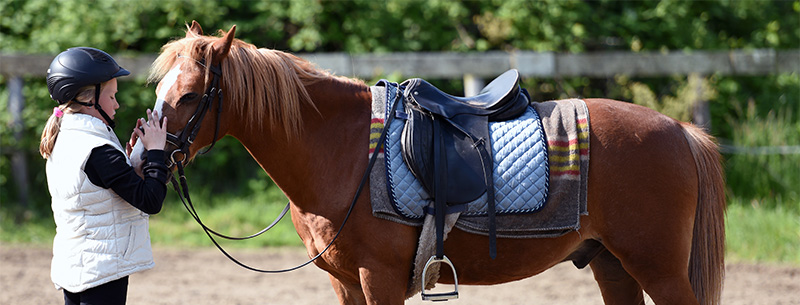The bond between humans and animals is a great source of joy, comfort and companionship.
So it’s no surprise that working with horses can be highly beneficial for some children and adults with special needs.
We recently came across a great article in Source Kids about Equine Facilitated Learning (EFL) by teacher and EFL instructor Elaine Russell which we thought we would share.
Elaine explains why being around horses is so beneficial and how EFL can provide a safe place to learn and grow.
Working with horses.
Relationships between people and animals can have profound benefits whether done on their own or as part of a wider treatment program.
Horses interact with people without judgement – plus they look, smell and feel good! Just hanging around them can improve a situation or an outlook on life.
Few would dispute that horse interactions are beneficial and many options are now available that use horses in therapeutic sessions. It’s important to do your research to determine which modality of therapy may be appropriate for you.
What is Equine Facilitated Learning and how does it differ from other types of equine therapy?
The difference between Equine Facilitated Learning (EFL for short) and other modalities using horses is the absence of any medically certified or medically qualified professional at the session.
We believe the horse is the “therapist” and the provider of any therapeutic benefits. As such, the facilitator of an EFL session is not required to have these qualifications.
No need to compete or ride.
There is no requirement to compete or even ride in EFL – it is about a different way of being with a horse and building different communications and relationships.
Being around a horse seems to allow people to experience a new way of “being” and release previous perceptions they may have about themselves. EFL provides a safe space for people to grow and expand into their potential. It is inspiring and positive for all who experience it.
No horse experience or skill is required to participate in EFL. Anyone of any age, background, ability or disability can benefit.
What to expect from an EFL session.
The majority of sessions involve interacting with the horse from the ground. The ground-based activities are designed to meet a group or individual’s way of learning, existing skills or educational/development goals.
Sessions may include:
- Grooming to assist cognitive skills, fine motor skills and focus
- Ground work to aid fine and gross motor skills, emotional control, focus and multi-tasking
- Lunging targeting fine and gross motor skills, cognitive skills and multi-tasking.
Sometimes there are benefits to the client being on the horse as movement can be a foundation for improving sensory processing.
The benefits of EFL.
Benefits from participation in EFL have been observed in the following areas:
- Communication
- Self esteem
- Co-ordination and motor skills
- Focus and observation
- Respect
- Self-control and self-awareness
- Relationships.
Often participants must modify or adapt their energy levels and actions in order to achieve the desired interaction with the horse. When the modified behaviour results in success, the behaviour will often continue after the participant has left the horse. Repeated sessions can result in longer term effects.
We appreciate Source Kids and Elaine Russell from Australian Equine Facilitated Learning (AEFL) allowing us to share this story with you.
More on equine therapies from Leap in!
If you’re interested in reading further about how equine therapies may benefit children or adults with special needs, check out our previous stories:
If you’d like to speak to a member of our crew about how equine assisted therapies fits in with your plan, please give us a call on 1300 05 78 78, contact us via our website (online chat available) or email connect@leapin.com.au.
Further reading
Will the NDIS fund an assistance animal?

